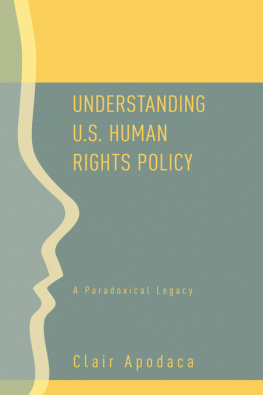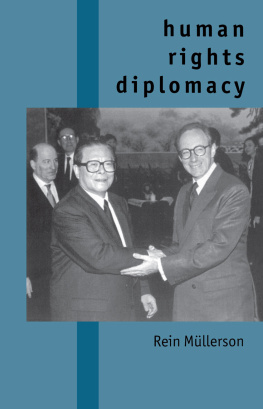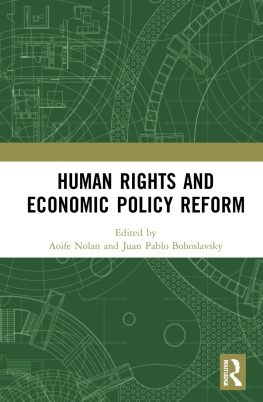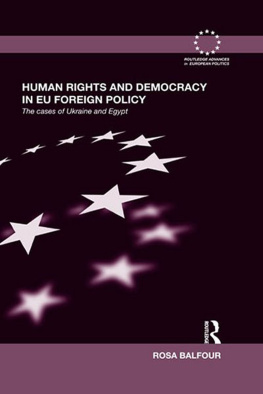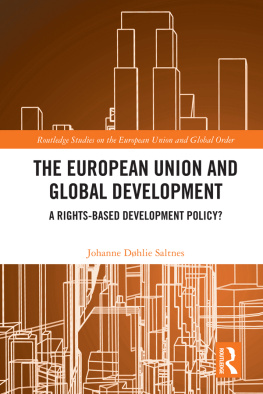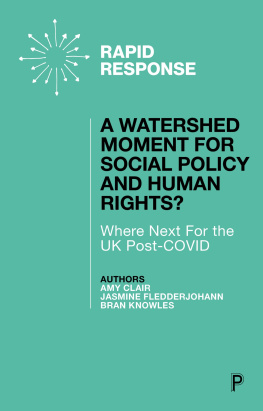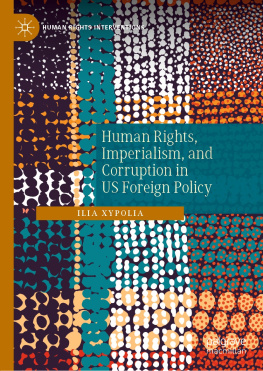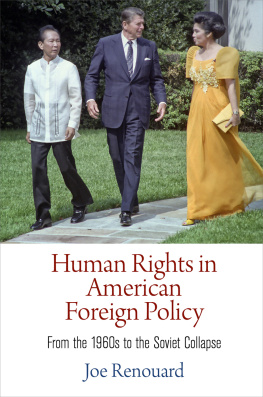Human Rights and U.S. Foreign Policy
Human Rights and U.S. Foreign Policy provides a comprehensive historical overview and analysis of the complex and often vexing problem of understanding the formation of U.S. human rights policy.
The proper place of human rights and fundamental freedoms in U.S. foreign policy has long been debated among scholars, politicians, and the American public. Clair Apodaca argues that the history of U.S. human rights policy unfolds as a series of prevarications that are the result of presidential preferences, along with the conflict and cooperation among bureaucratic actors.
Through a series of chapters devoted to U.S. presidential administrations from Richard Nixon to the present, she delivers a comprehensive historical, social, and cultural context to understand the development and implementation of U.S. human rights policy. For each administration, she pays close attention to how ideology, bureaucratic politics, lobbying, and competition affect the inclusion or exclusion of human rights in the economic and military aid allocation decisions of the United States. She further demonstrates that from the inception of U.S. human rights policy, presidents have attempted to tell only part of the truth or to reformulate the truth by redefining the meaning of the terms human rights, democracy, or torture, for example. In this way, human rights policy has been about prevarication.
Human Rights and U.S. Foreign Policy is a key text for students, which will appeal to all readers who will find a historically informed, argument driven account of the erratic evolution of U.S. human rights policy since the Nixon Administration.
Clair Apodaca (Ph.D., Purdue University, 1996) is an associate professor in the Department of Political Science at Virginia Tech University.
Routledge Studies in Human Rights
Series Editors: Mark Gibney, UNC Asheville, USA,
Thomas Gammeltoft-Hansen, Raoul Wallenberg Institute, Sweden, and Bonny Ibhawoh, McMaster University, Canada
The Routledge Human Rights series publishes high quality and cross-disciplinary scholarship on topics of key importance in human rights today. In a world where human rights are both celebrated and contested, this series is committed to create stronger links between disciplines and explore new methodological and theoretical approaches in human rights research. Aimed towards both scholars and human rights professionals, the series strives to provide both critical analysis and policy-oriented research in an accessible form. The series welcomes work on specific human rights issues as well as on cross-cutting themes and institutional perspectives.
Sovereignty, State Failure and Human Rights
Petty Despots and Exemplary Villains
Neil Englehart
Understanding Statelessness
Edited by Tendayi Bloom, Katherine Tonkiss and Phillip Cole
Human Rights in Democracies
Peter Haschke
Extraordinary Rendition
Addressing the Challenges of Accountability
Edited by Elspeth Guild, Didier Bigo and Mark Gibney
Truth, Silence and Violence in Emerging States
Histories of the Unspoken
Edited by Aidan Russell
Human Rights and U.S. Foreign Policy
Prevarications and Evasions
Clair Apodaca
For more information about this series, please visit: https://www.routledge.com/Routledge-Studies-in-Human-Rights/book-series/RSIHR
Human Rights and U.S. Foreign Policy
Prevarications and Evasions
Clair Apodaca
First published 2019
by Routledge
52 Vanderbilt Avenue, New York, NY 10017
and by Routledge
2 Park Square, Milton Park, Abingdon, Oxon, OX14 4RN
Routledge is an imprint of the Taylor & Francis Group, an informa business
2019 Taylor & Francis
The right of Clair Apodaca to be identified as author of this work has been asserted by her in accordance with sections 77 and 78 of the Copyright, Designs and Patents Act 1988.
All rights reserved. No part of this book may be reprinted or reproduced or utilised in any form or by any electronic, mechanical, or other means, now known or hereafter invented, including photocopying and recording, or in any information storage or retrieval system, without permission in writing from the publishers.
Trademark notice: Product or corporate names may be trademarks or registered trademarks, and are used only for identification and explanation without intent to infringe.
Library of Congress Cataloging-in-Publication Data
A catalog record for this title has been requested
ISBN: 978-0-8153-8354-3 (hbk)
ISBN: 978-0-8153-8355-0 (pbk)
ISBN: 978-1-351-20583-2 (ebk)
Typeset in Times New Roman
by codeMantra
Francois Debrix
friend, husband, colleague
My thanks to all those many people who have sustained and loved me no matter what: Francois, Jeremy, Elizabeth, and Ethan. I would also like to acknowledge Natalja Mortensen, Senior Editor, for her support of my work.
Prevarication denotes a lie. However, the connotation of prevarication softens to a half-truth or convoluted falsehood. Prevarication is about using ambiguity, omissions, or evasion to bend the truth and to mislead. In 1823, Clarke wrote that
prevarication is the giving of contradictory or inconsistent evidence, which affects the credibility of the evidence, though neither the extent of the witnesss falsehood, nor the precise points in which he has departed from the truth be capable of ascertainment.
(Clarke 1823 as quoted in Schneider 2007: 316)
Thus, while to prevaricate means to lie, it also implies making it difficult to discern exactly what the lie is through the use of ambiguous language and the withholding of information. Since the inception of U.S. human rights policy, presidents have attempted to tell only part of the truth or to reformulate the truth by redefining the meaning of the terms human rights, democracy, or torture, for example. In this way, human rights policy has been about prevarication.
Presidents prevaricate for any number of reasons, but the primary reasons are convenience, self-promotion, and to further their political agenda. The aim of policy prevarication is to ensure that Congress and the public view the presidents agenda favorably. In order to do so, the president will shade the truth, cherry-pick facts and circumstances that favor his position, while neglecting inconvenient evidence that may derail his program. Presidents, in the words of Cannon, have a difficult time resisting the short-term gain a lie can afford them (2007: 65). This suggests that presidents have both a capacity and a disposition to lie.
Before reviewing the prevarications associated with U.S. human rights policy, we will review the Congressional and bureaucratic structure and conflict associated with foreign aid. After all, Congress and executive bureaucracy either assist or resist the deception. It is possible that the Congress and the executive bureaucracy are complicit in presidential prevarications. On the other hand, it is also possible that Congress and the career bureaucrats harbor misgivings regarding the presidents agenda and actively subvert and resist its implementation.


